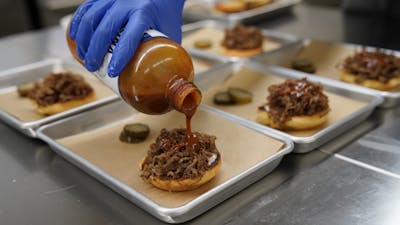Wyss Lumineer Luke MacQueen’s journey from chasing a dream to running a company
By Lindsay Brownell

By day, Luke MacQueen was a graduate student at Polytechnique Montréal studying engineering physics. But by night, he dreamed of turning a piece of science fiction into reality: growing meat to feed the planet without harming animals. In an era of Impossible Meat and Beyond Burgers, it can be hard to remember that in 2011, animal-free meat was largely regarded as fantasy, and Luke was used to people rolling their eyes when he waxed poetic about it.
But then he saw a chance to bring his sci-fi dream to life in the form of a poster for an event that was being hosted more than 250 miles away in Boston: the 2011 Wyss Symposium. He was familiar with the work of some of the Wyss Institute’s researchers, and he was inspired by their approach of learning from biology and leveraging it for engineering purposes. “That was a little ‘outside the box’ at the time, and it was super interesting and promising to me,” MacQueen recalls.
The Symposium offered him the chance to meet many of these pioneers in the same place at the same time, so he booked a bus ticket and made the seven-hour journey from Canada to New England.
He had no idea that this trip would change the course of his life.
Building the dream team
The science he saw at the Wyss Symposium gave him hope that growing animal-free meat would become a reality within his lifetime. “They were engineering muscle tissue and fat tissue – and that’s what meat is. All that needed to be done was to figure out how to grow it, which seemed very promising…but a bit far off in the future at the time,” MacQueen says.
Two years later, he found himself applying for a postdoc job in the lab of Wyss Associate Faculty member Kit Parker, whose work included engineering living tissues. The interview started off normally, but then MacQueen brought up the question that had been burning in his brain for years: What if we could just grow meat?
“Usually people treated that as a little bit weird, but he didn’t – he got really excited about it. We actually had a whole discussion about how that could be done in a realistic time frame, and it completely sold me on moving down here and starting this type of research.” MacQueen says. It probably helped that Parker is also a meat-loving, Kansas City Barbeque Society-certified judge.
MacQueen started working in Parker’s lab in July 2013. There, he met Christophe Chantre and Grant Gonzalez, both graduate students at the time. Chantre wanted to apply his background in materials science to solve problems in sustainability and climate, and Gonzalez had just invented what MacQueen calls a “high-tech cotton candy machine” that could turn almost anything into a fiber. The three of them realized that, because muscle fibers are the building blocks of meat tissues, they could theoretically use it to spin almost any edible material into artificial meat.
They got to work.
There was a huge, huge opportunity in plant-based meats, because up until then no company had solved the texture problem. The only meat products that could sort of be replaced with plant-based meat were the highly processed ones, like burgers and sausages, because their texture is also highly processed. We decided the time was right to start a company that could use our spun-fiber technology to make animal-free meat taste and feel like the real thing.

Growing the next generation of meat
Over the next seven years, the three of them worked to improve and perfect their technique for making animal-free meat in spare moments between other research. Once they were able to put a powdered meal replacement product into their machine and spin it into edible chunks that resembled tiny turkey breasts, they knew their pet project had real potential.
“There was a huge, huge opportunity in plant-based meats, because up until then no company had solved the texture problem. The only meat products that could sort of be replaced with plant-based meat were the highly processed ones, like burgers and sausages, because their texture is also highly processed. We decided the time was right to start a company that could use our spun-fiber technology to make animal-free meat taste and feel like the real thing,” says MacQueen.
MacQueen, Chantre, Gonzalez and Parker co-founded Tender Food, which launched from the Wyss Institute in 2020 – almost a decade after MacQueen got on that bus to Boston. Over its first two years, the company focused on further optimizing its technology, both the fiber spinning machines and the materials they were making their meat from.
“No one ever asked us when we were in the lab, ‘Is this scalable?’ But that’s what everybody asks when you’re a startup. It’s the central thing. Chicken, for example, is not a very expensive meat. So to make a competitive meat-free chicken, we had to show that we could make stuff that’s of similar quality, but lower cost,” says Chantre.
All that hard work paid off. In 2022, Tender announced they had closed their seed round of funding, to the tune of $12 million led by Lowercarbon Capital. Their products are now available at nearly a dozen Boston-area restaurants, and more are in development. The company aims to increase their production capacity to the tune of millions of pounds of meat-free meet over the next 18 months.
For MacQueen, his initial drive to answer the question, “Can we grow meat?” has morphed into a mission to use technology to reduce the environmental impact of food production, which currently accounts for fully one-third of the world’s greenhouse gas emissions. “If we can make plant-based meat so delicious and affordable that people want to eat it more than they want to eat chicken or beef, then we’ll know we’ve really done something good for the world.”
